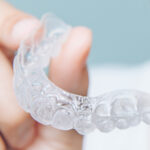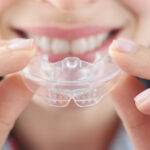If you wake up with sore jaw muscles or notice excessive wear on your teeth, you might be one of the millions affected by bruxism, commonly known as teeth grinding. Bruxism can lead to a range of dental issues, from chipped enamel to chronic jaw pain. Fortunately, there’s a simple solution to protect your teeth and alleviate discomfort: dental guards for bruxism.
Understanding Bruxism
Bruxism is a condition characterized by the involuntary grinding, clenching, or gnashing of teeth, typically during sleep. It affects both adults and children and can be caused by stress, anxiety, misaligned teeth, or sleep disorders. Left untreated, bruxism can result in significant damage to the teeth, gums, and jaw.
What are Dental Guards?
Dental guards, also known as night guards or occlusal splints, are custom-fitted devices worn over the teeth to protect them from the effects of bruxism. These guards create a barrier between the upper and lower teeth, preventing them from coming into contact and reducing the impact of grinding and clenching.
Role of Dental Guards in Treating Bruxism
Dental guards play a crucial role in managing bruxism by:
- Preventing Teeth Grinding: By providing a cushioning barrier, dental guards minimize the damage caused by grinding and clenching, preserving the integrity of the teeth.
- Protecting Teeth and Jaw: Dental guards help distribute the forces generated during bruxism, reducing strain on the teeth and alleviating pressure on the jaw joints.
Choosing the Right Dental Guards for Bruxism
When selecting a dental guard, it’s essential to consider several factors, including the severity of your bruxism, comfort, and budget. While over-the-counter guards are available, they may not provide the same level of protection or comfort as custom-fitted guards prescribed by a dentist.
How Dental Guards Work
Dental guards work by:
- Mechanism of Action: By creating a barrier between the upper and lower teeth, dental guards absorb the forces generated during grinding and clenching, preventing direct contact between the teeth.
- Proper Usage and Maintenance: Properly fitting and maintaining your dental guard is essential for optimal effectiveness. Clean your guard regularly and store it in a protective case when not in use.
Effectiveness of Dental Guards
Numerous studies have demonstrated the effectiveness of dental guards in reducing the symptoms of bruxism and protecting the teeth from damage. Many patients report significant improvements in their symptoms and overall comfort after using a dental guard regularly.
Getting Fitted for a Dental Guard
At Madison Dentistry & Implant Center, our experienced dental professionals will take impressions of your teeth to create a custom-fitted dental guard tailored to your unique bite and jaw structure. A proper fit is essential for comfort and effectiveness, ensuring maximum protection against bruxism-related damage.
Cost of Dental Guards
The cost of a dental guard can vary depending on factors such as the type of guard, materials used, and your location. While custom-fitted guards may have a higher upfront cost, they offer superior comfort and protection compared to over-the-counter options. Many dental insurance plans cover part or all of the cost of a dental guard, making it an affordable solution for bruxism sufferers.
Risks and Side Effects
While dental guards are generally safe and well-tolerated, some users may experience minor side effects such as jaw discomfort or changes in bite alignment. These issues are usually temporary and can be addressed by adjusting the fit of the guard or using it for shorter periods until you adjust.
Book a Consultation with Madison Dentistry & Implant Center
Begin your journey toward attaining the smile of your dreams today! Reach out to our skilled team at Madison Dentistry & Implant Center without delay to arrange your consultation. Our compassionate dentists and dental experts will evaluate your oral health, attentively address your desires and concerns, and devise a personalized treatment strategy tailored exclusively to your needs.




